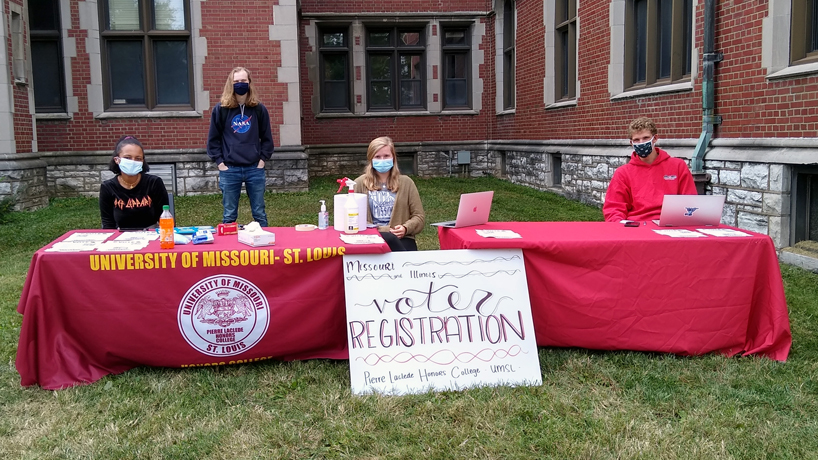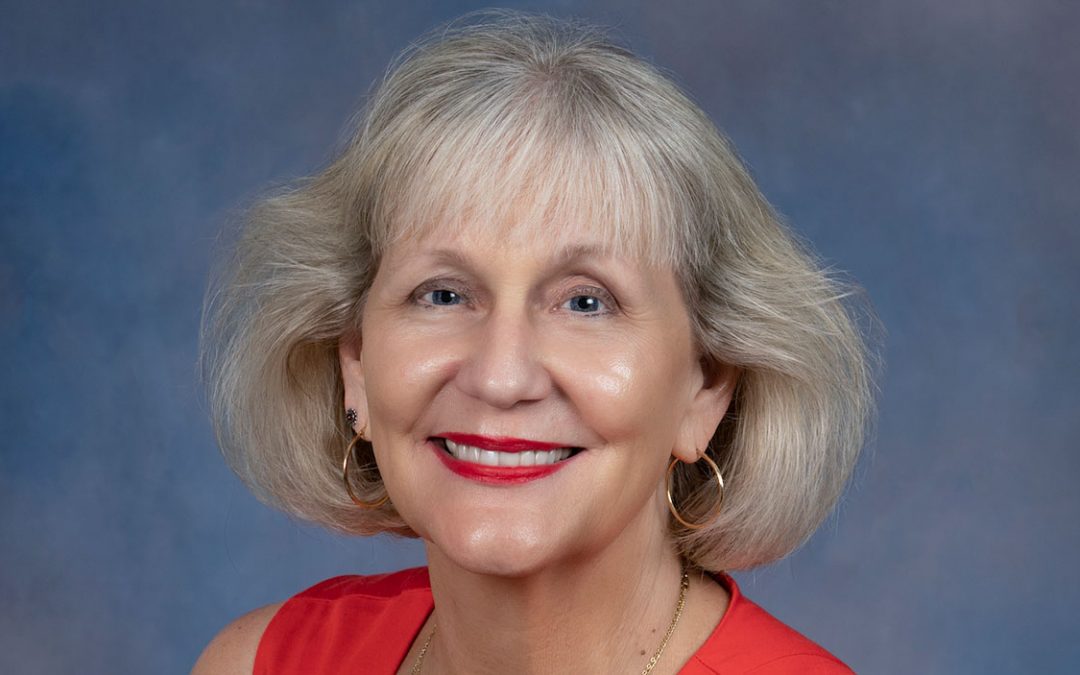
Students in Charlie Herrick’s “American Traditions: Social and Behavioral Science” class worked a voter registration table in front of Villa Hall in September 2020, ahead of the November election. Events like that helped UMSL students be engaged, and they voted at a rate of 71.2% in the 2020 election. (Photo courtesy of Charlie Herrick)
The University of Missouri–St. Louis is home to some of the most civically engaged students in the country, and those students turned out at even higher rates in the 2020 presidential election.
A report from the Institute for Democracy & Higher Education at Tufts University, creators of the National Study of Learning, Voting and Engagement, revealed that 71.2% of all UMSL students voted in the 2020 election. That marked an increase of 4.4 percentage points over the voting rate of UMSL students in 2016 and was also more than 5 points higher than the national average.
“We already started out with a really high voter registration and voting record,” said Patricia Zahn, UMSL’s director of community engagement and outreach. “We started working with NSLVE in 2012 when they first started and had a 62% rate then, and we’ve increased it almost 10 percentage points over the last eight years. Our students have just stepped up. Different student organizations work with our Civic Engagement Coalition and come up with some great ideas and were so active in the 2020 election cycle.”
Among those student groups are the Political Science Academy, Student Government Association, Associated Black Collegians, Associated Students of the University of Missouri and the Student Social Work Association.
UMSL also partnered with the Campus Election Engagement Project and had several student fellows who held drop-in class “visits” – most of them virtually – to help students register to vote. The fellows also helped lead on-campus voter education events and took part in virtual film screenings, debate watches and panel discussions.
“UMSL as a campus embraces civic engagement and sees that as part of our mission,” said Anita Manion, an assistant professor of political science who is a member of the Civic Engagement Coalition. “I don’t think it’s discipline specific on our campus. It is part of our campus personality and who we say we are, and then we live that out.”
Manion noted that she team taught a course in the fall of 2020 with Scott Gericke, an assistant teaching professor in the Department of Art and Design. Graphic design students created Zoom backgrounds and facemasks themed around voter participation and also simultaneously learned more about public policy and voting rights.
Nationwide, NSLVE’s authors reported a record-breaking set of findings. On campuses across the country, student voter turnout jumped to 66% in the 2020 election, a 14 percentage point increase from 2016. That outpaced that the increased turnout by Americans overall, which jumped 6 percentage points from 61% to 67%, according to the U.S. Census Bureau.
“That students, often younger and first-time voters, turned out at rates commensurate with the general public is nothing short of stunning,” IDHE Director Nancy Thomas said. “We attribute this high level of participation to many factors, including student activism on issues such as racial injustice, global climate change and voter suppression, as well as increased efforts by educators to reach students and connect them to the issues and to voting resources.”
NSLVE is the nation’s largest study of college and university student voting. Institutions must opt-in to the study, and at this time, nearly 1,200 campuses of all types – community colleges, research universities, minority-serving and women’s colleges, state universities, and private institutions – participate. The dataset reflects all 50 states and the District of Columbia and includes 49 of the nation’s 50 flagship schools. IDHE uses de-identified student records to ensure student privacy. The 2020 dataset is robust with 8,880,700 voting-eligible students representing 1,051 colleges and universities.
Manion said it’s important to get college-aged voters engaged for the future of the democratic process.
“Research suggests that voting is a habit, and getting young people to be habitual voters earlier in life makes it much more likely they will continue to vote in elections throughout their lifetimes,” she said.
The Civic Engagement Coalition works to raise awareness of and participation in voting every year, not only in the event of presidential elections, and they’ll be ramping up activities – including voter registration drives and information sessions – leading into this fall’s elections.
Currently, members of the Civic Engagement Coalition are accepting nominations for the UMSL Excellence in Civic Engagement Award, which honors one student, one staff member and one faculty member who demonstrate sustained commitment to civic engagement, both on and off campus.
Nominations for the awards are due by March 4. The winners will be announced at the Leadership Awards Banquet, hosted by the Office of Student Involvement, on April 25.














